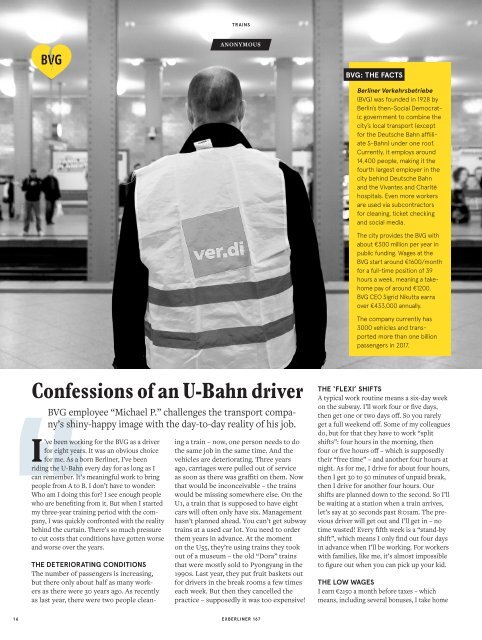Exberliner Issue 167, January 2018
You also want an ePaper? Increase the reach of your titles
YUMPU automatically turns print PDFs into web optimized ePapers that Google loves.
TRAINS<br />
ANONYMOUS<br />
BVG: THE FACTS<br />
Berliner Verkehrsbetriebe<br />
(BVG) was founded in 1928 by<br />
Berlin’s then-Social Democratic<br />
government to combine the<br />
city’s local transport (except<br />
for the Deutsche Bahn affiiliate<br />
S-Bahn) under one roof.<br />
Currently, it employs around<br />
14,400 people, making it the<br />
fourth largest employer in the<br />
city behind Deutsche Bahn<br />
and the Vivantes and Charité<br />
hospitals. Even more workers<br />
are used via subcontractors<br />
for cleaning, ticket checking<br />
and social media.<br />
The city provides the BVG with<br />
about €300 million per year in<br />
public funding. Wages at the<br />
BVG start around €1600/month<br />
for a full-time position of 39<br />
hours a week, meaning a takehome<br />
pay of around €1200.<br />
BVG CEO Sigrid Nikutta earns<br />
over €433,000 annually.<br />
The company currently has<br />
3000 vehicles and transported<br />
more than one billion<br />
passengers in 2017.<br />
Confessions of an U-Bahn driver<br />
BVG employee “Michael P.” challenges the transport company’s<br />
shiny-happy image with the day-to-day reality of his job.<br />
I’ve been working for the BVG as a driver<br />
for eight years. It was an obvious choice<br />
for me. As a born Berliner, I’ve been<br />
riding the U-Bahn every day for as long as I<br />
can remember. It’s meaningful work to bring<br />
people from A to B. I don’t have to wonder:<br />
Who am I doing this for? I see enough people<br />
who are benefiting from it. But when I started<br />
my three-year training period with the company,<br />
I was quickly confronted with the reality<br />
behind the curtain. There’s so much pressure<br />
to cut costs that conditions have gotten worse<br />
and worse over the years.<br />
THE DETERIORATING CONDITIONS<br />
The number of passengers is increasing,<br />
but there only about half as many workers<br />
as there were 30 years ago. As recently<br />
as last year, there were two people cleaning<br />
a train – now, one person needs to do<br />
the same job in the same time. And the<br />
vehicles are deteriorating. Three years<br />
ago, carriages were pulled out of service<br />
as soon as there was graffiti on them. Now<br />
that would be inconceivable – the trains<br />
would be missing somewhere else. On the<br />
U1, a train that is supposed to have eight<br />
cars will often only have six. Management<br />
hasn’t planned ahead. You can’t get subway<br />
trains at a used car lot. You need to order<br />
them years in advance. At the moment<br />
on the U55, they’re using trains they took<br />
out of a museum – the old “Dora” trains<br />
that were mostly sold to Pyongyang in the<br />
1990s. Last year, they put fruit baskets out<br />
for drivers in the break rooms a few times<br />
each week. But then they cancelled the<br />
practice – supposedly it was too expensive!<br />
THE ‘FLEXI’ SHIFTS<br />
A typical work routine means a six-day week<br />
on the subway. I’ll work four or five days,<br />
then get one or two days off. So you rarely<br />
get a full weekend off. Some of my colleagues<br />
do, but for that they have to work “split<br />
shifts”: four hours in the morning, then<br />
four or five hours off – which is supposedly<br />
their “free time” – and another four hours at<br />
night. As for me, I drive for about four hours,<br />
then I get 30 to 50 minutes of unpaid break,<br />
then I drive for another four hours. Our<br />
shifts are planned down to the second. So I’ll<br />
be waiting at a station when a train arrives,<br />
let’s say at 30 seconds past 8:01am. The previous<br />
driver will get out and I’ll get in – no<br />
time wasted! Every fifth week is a “stand-by<br />
shift”, which means I only find out four days<br />
in advance when I’ll be working. For workers<br />
with families, like me, it’s almost impossible<br />
to figure out when you can pick up your kid.<br />
THE LOW WAGES<br />
I earn €2150 a month before taxes – which<br />
means, including several bonuses, I take home<br />
16<br />
EXBERLINER <strong>167</strong>


















